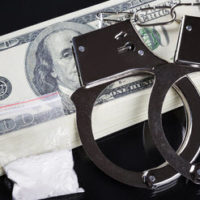Possession of Illegal Drugs in Maryland

The subject for exploration today centers on the possession of illegal drugs and other controlled substances in Maryland. To gain a full appreciation of this legal issue, the following sections will examine key definitions and penalties for this offense.
Possession of Illegal Drugs
Under Code of Maryland Section 5–601, it is illegal to obtain or attempt to obtain illegal drugs or other controlled substances by:
- Deceiving, misrepresenting or lying;
- Altering or forging a prescription or written order;
- Disguising material facts;
- Employing a fake name or address; or
- Pretending to be an authorized maker or distributor.
That being said, there is an important exception. It is lawful to obtain or administer illegal drugs or other controlled substances pursuant to a valid medical prescription.
Penalties for Possession of Illegal Drugs
In most circumstances, possession of illegal drugs is a misdemeanor crime under Section 5-601. The potential penalties for this offense include up to four years in prison and $25,000 in fines, either or both.
Penalties for Possession of Marijuana
In terms of marijuana, specifically, Section 5-601 outlines several additional considerations. Generally speaking, there are less severe penalties for the possession of small amounts of marijuana.
For example, please find below the penalty structure for the possession of fewer than 10 grams of marijuana:
- First Conviction — Is classified as a civil offense punishable by up to $100 in fines;
- Second Conviction — Is classified as a civil offense punishable by up to $250 in fines; and
- Third or Subsequent Conviction — Is classified as a civil offense punishable by up to $500 in fines.
On the other hand, possession of large amounts of marijuana can result in more severe penalties. In those cases, the penalties can include up to one year in prison and $1,000 in fines, either or both.
Marijuana for Medical Use
As outlined in Section 5-601, Maryland recognizes the increasing use of marijuana to treat certain debilitating medical conditions. If a person can show that they possessed marijuana out of medical necessity, it is possible to avoid civil fines and criminal charges altogether. This is referred to legally as an affirmative defense.
However, the affirmative defense of medical necessity is not available if the offender:
- Smoked or used marijuana in a public place; or
- Possessed more than 28 grams of marijuana.
Substance Abuse Education and Treatment
In many cases, a conviction for illegal drug possession carries additional requirements. These requirements apply to all illegal drugs and controlled substances, including marijuana.
Following a conviction, the court will usually order the offender to:
- Attend a substance abuse education course endorsed by the Maryland Department of Health and Mental Hygiene;
- Submit to an evaluation for substance abuse; and
- Complete substance abuse treatment.
Do You Need Legal Help?
If you are facing charges for a drug crime in Maryland, it can be especially beneficial to retain the services of an accomplished criminal defense attorney. The attorneys at Iamele & Iamele, LLP in Baltimore, Maryland, know how to defend against a variety of criminal charges, including drug crimes. If you need legal help, contact us today for a free initial consultation.

